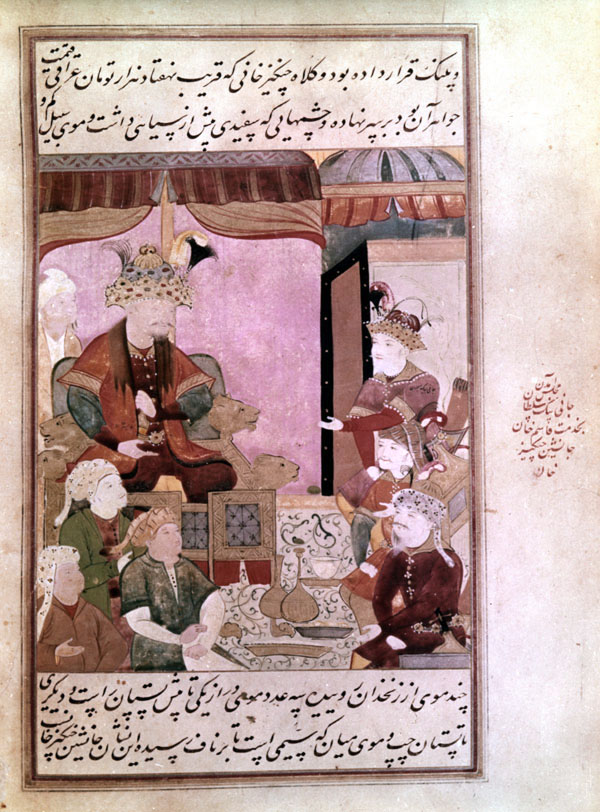Manuscripts
tāriḵ-e ʿālām-ārā-ye šāh esmāʿil
Following the massacre at Qarši (f.241v), Emir Najm-e Sāni was bogged down in the siege of Ḡojdovān. Hearing of their plight, two Uzbeg sultans from Transoxiana, Jāni Beg Solṭān and ʿAbdollāh Ḵān, assembled an army and marched against Emir Najm. A battle took place on 12 November 1512, and the qezelbāš were scattered and thrown into confusion. Heartily sick of the haughty arrogance of Emir Najm, the qezelbāš made little attempt to defend him, and he was subsequently taken prisoner and put to death. Encouraged by their victory, the Uzbeg sultans saw the opportunity to invade and recapture Khorasan, which had been taken from them earlier by Esmāʿil. Seeking to expand the size of their force, Jāni Beg called upon Qāsem Ḵān, the chieftain of a branch of Uzbegs in southern Russia, known as the Khanate of Qasemoff, for assistance. Qāsem Ḵān traced his lineage directly to Čengiz Ḵān, and considered himself the heir to that conqueror’s territory. The Uzbeg defeat of Emir Najm and Jāni Beg’s convincing arguments persuaded Qāsem Ḵān to lend support, which he sent under the command of his son Abuʾl Ḵeyr Ḵān (see folio 280).
Qāsem Ḵān is portrayed in the upper left the largest and most important personage in the composition, seated on an elevated throne with four lion heads. He wears a maroon robe, an orange outer garment with a fur collar, and a large bejeweled gold crown. One attendant stands behind the throne, while three advisors, all wearing turbans, are seated in the left foreground. The setting is Qāsem Ḵān’s tent, the front of which is open and drawn back. Behind him is a flat light mauve surface, and on the floor an off-white carpet with silver arabesques, on which are placed various decanters and dishes. The central vertical axis is devoid of any figures, but off to the right are three personage facing Qāsem Ḵān. The furthest back and most important of them is Jāni Beg Solṭān, who also wears a jewel studded crown. The three appear to be actively engaged in a discussion with Qāsem Ḵān and his advisors.

Painting: 15.9 x 13.3 cm. Two lines of text above and below the painting. Frame encloses painting and text. A red marginal inscription, probably of later date, describes the event. Inscriptions in black are written on two figures, identifying them as Jāni Beg Solṭān and Qāsem Ḵān. The painting is worn in places; minor smears in the calligraphy. No other signs of damage or retouching.
Miniature references:
Mahboubian Cat., #923 folio 273v, (not illustrated).
Text references:
Muntazar, p.483; Savory, SA, p.84.
Painting references:
Mahboubian_1972, #923 folio 273v (not ill.).
Text X-references:
See Muntaẓer-Ṣāḥeb_1970, p.483 for this event in the History of Shah Esmāʿil.
See Savory, SA_1979, p.84 for this event in the History of Shah ʿĀbbās.
Robert Eng
Last Updated: December 15, 2010
Originally published: April 4, 2002